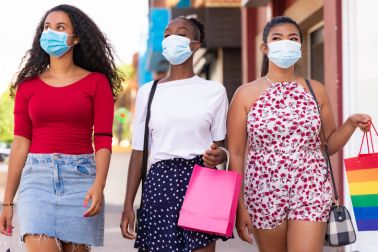
Source: Giuseppe Manfra / Getty
Americans are bracing themselves for another COVID-19 surge amid the steady rise of the Omicron BA.2 subvariant, but health experts argue that there won’t be a significant spike in cases, mostly due to the fact that a majority of Americans have been exposed to some level of COVID-19 antibodies, either from vaccination or infection. Studies suggest that the antibodies may give an individual’s immune system the ammo it needs to fight back against the virus.
The Centers for Disease Control and Prevention conducted a survey that closely examined a number of blood donor samples dating back to December. CDC researchers found that 95 percent of Americans 16 and older had some exposure to COVID antibodies, a majority of which came from vaccinations. Currently, 76.9 percent of Americans have received at least one dose of the vaccine, but the data for fully vaccinated individuals remains low at 65.5 percent, signaling that we still have a long way to go until the pandemic is fully over.
RELATED CONTENT: Health Officials Fear Another COVID-19 Surge As Cases Of The “Stealth Omicron” Variant Begin To Rise
There are different types of COVID-19 antibody immunity
With emerging variants popping up left and right, health officials say it’s hard to tell whether another COVID-19 spike will occur. While Americans are slowly building up their COVID-19 antibodies, scientists are still unclear as to whether they actually help to protect against COVID-19. Why? There are two types of antibody immunity.
According to CNBC, antibodies in people who are fully vaccinated “tend to decline after about four to six months post-shot” so you will need an additional booster shot to help build up antibodies again. Back in mid-March, Pfizer CEO Albert Bourla announced that Americans would need the protection of a fourth vaccine dose to boost their immunity against BA. 2 and future mutations of the virus. The company is currently developing an Omicron-specific vaccine to help combat the issue.
A study conducted by the Yale School of Public Health found in October 2021, that people who are unvaccinated could have immunity against reinfection “anywhere from three to 61 months after getting Covid,” but at the time, Yale researchers didn’t factor in other mutations like Omicron or the BA. 2 variant, often called Stealth Omicron, which has now become the dominant strain of COVID-19 in the U.S. In the Northeast, BA. 2 now accounts for 70 percent of cases alone. The tricky part about Stealth Omicron is that it’s been found to partially evade “the immune protection” that vaccines provide, making it even more of a challenge to create medicine that will protect the immune system against COVID-19 strains.
Not all antibodies fight back against COVID-19
Antibodies are blood proteins our body has designed to defend and counteract specific antigens. Think of them as small soldiers who head out to battle in our bodies to fight off bacteria, viruses, and foreign substances in the blood. Well, sometimes those antibody soldiers get hurt during combat, making it difficult for them to protect our immune system. Some may not be able to fight back at all. Dr. Salman Khan, a health expert in infectious disease at Lenox Hill told CNBC some COVID-19 antibodies don’t have “‘Covid-fighting’ or neutralizing” abilities. “Non-Neutralizing antibodies” can develop when a pathogen enters the body.
“These antibodies do not bind sufficiently to the specific site on the pathogen to stop it from continuing to cause infection. In the case of SARS-CoV-2, this may have to do with mutations to the spike protein,” Khan added.
While non-neutralizing antibodies still attach themselves to foreign pathogens in the body, they serve as an alarm system, indicating that there are problems present within the immune system. These types of antibodies don’t stop the virus from spreading, which means while antibodies are good, they aren’t enough to protect against infection or even reinfection.
Keep following COVID safety guidelines
We’re two years into this global crisis and there’s still so much we don’t know about COVID-19. The best way to stay safe is to follow COVID-19 health and safety measures recommended by the CDC. Wash your hands often before eating food or touching your face and try to avoid poorly ventilated areas. COVID-19 has been known to spread quicker in small tightly packed areas like bars or classrooms where airflow doesn’t allow for COVID-19 droplets to escape. Try to stay six feet apart from people when indoors or in public spaces and constantly disinfect common areas and surfaces with high contact like doorknobs, the kitchen faucet, computers, and desks. Most importantly, keep those masks on when entering crowded places.
For more information on how to stay safe, visit the CDC website.
RELATED CONTENT: You May Be At Risk Of Becoming Severely Ill From COVID-19 If You Have These Underlying Medical Conditions









